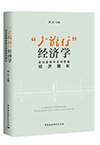Analysis of economic performance amid pandemic

Economics of Pandemic: Weathering the Storm and Restoring the Growth
Economics of Pandemic: Weathering the Storm and Restoring the Growth focuses on the impact of the global COVID-19 pandemic on the domestic economy. Edited by Cai Fang, vice president and Member of the Chinese Academy of Social Sciences (CASS), and co-authored by scholars from CASS and other institutions, it analyzes work regarding agriculture, rural areas and rural residents, industry and supply chains, employment and people’s livelihood, and the interaction between the Chinese economy and the world economy from both demand and supply perspectives. The book is China’s first systematic collection of research reports on the impact of the pandemic on the domestic economy, providing valuable data for policy analysis and formulation and for future economic studies on the pandemic.
The COVID-19 pandemic is essentially a public health event that relates to the health and lives of numerous people. When analyzing its impact, we should first uphold the principle of people first and life over all. The book stresses that compared with short-term economic losses caused by epidemic prevention and control, saving lives has much higher social value. Governments should implement people-centered policies, for example, lowering economic growth goals. Meanwhile, special attention should be paid to low and middle-income groups. Low-income groups are more vulnerable to the pandemic due to lack of medical security and stable incomes. The book repeatedly stresses the importance of ensuring people’s basic livelihoods and suggests being vigilant against the increased polarization of wealth caused by the pandemic.
Different from traditional economic cycles, the impact of the pandemic is exogenous. Suspension of production and social isolation first impacts the supply side. Although the demand side is also affected, the supply side is the source. Typical economic recovery is driven by the demand side; instead, the supply grows stronger than demand in post-pandemic economic recovery. First of all, the shock in supply is a result of physical isolation. Since the labor force does not drop significantly, physical constraints on resuming work will be reduced or even disappear once the isolation is lifted, causing a quick rebound in supply. In addition, both corporate and household debt has risen during the pandemic. This provides strong incentive to resume production and work to increase income and improve balance sheets. Furthermore, in order to maintain social stability and reduce economic losses, governments will create favorable conditions for companies to resume production once the spread of the virus is effectively curbed.
Peng Wensheng is vice chairman of China Chief Economist Forum.
edited by YANG LANLAN
